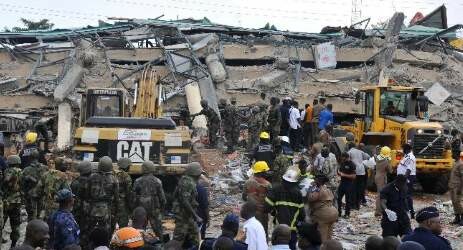
According to news reports, the shopping centre collapsed due to faulty construction, killing 14 people, although over 60 people were also rescued alive from the rubble. In this case, there were formal building codes in place, but there was a breakdown in their implementation at municipal government level. Sadly, it seems that this lack of compliance with construction standards was the sole cause of the building’s collapse.
A spokeswoman for Ghana's National Disaster Management Organization, Kate Adobaya, said structural weakness had caused the collapse. The Ghana Institution of Engineering Vice-President Magnus Quarshie also told the BBC's Focus on Africa programme on 8 November that they were still carrying out their investigations into the disaster, but commented that an examination of the debris showed that the “workmanship was very, very poor” and it was clear the concrete mix was not to the required specifications. He added that the building did not have a permit and may not have been inspected by the Accra Municipal Authority (AMA).
The Mayor of the AMA, Alfred Vanderpuye, said officials had been carrying out checks for the past two years to identify buildings without permits, but they had somehow missed this one. Ghana’s President, John Mahama, then said the government would put mechanisms in place to check the safety of other high-rise buildings to ensure there were no more similar disasters waiting to happen.
Samuel Kofi Addo, the Secretary-General of the Ghana Red Cross Society, recently reflected, “Our recovery work since the Melcom collapse has been all the sadder for knowing that this disaster could have been prevented if the regulations were applied. We will try to help reduce such risks by advocating to local government and improving community awareness of the need to enforce building codes. This is high on our priority list of community mobilization programs.”
Following the disaster, the Ghana Institute of Architects (GIA) called for a new law to require structural audits of existing buildings, as well as asking local and district governments to review their internal procedures for the acquisition of property for commercial and public use. The GIA President, Nii Adotei Brown, was quoted as saying, “The collapse of the Melcom shopping mall is clearly an event that could have been avoided if the necessary controls had been applied.”
Such problems are not unique to Ghana. Many developing countries, including those with the additional risk of earthquakes, face similar problems. In some cases there is not sufficient regulation, while in others the implementation process means they are not well enforced. However, the Melcom shop collapse is a sad reminder that building codes and their enforcement need to be made both a national and local priority, including regulatory mechanisms and public education to ensure they are well accepted and implemented.
Sources: www.bbc.co.uk/news/world-africa-20250494, 8 November 20129; www.ghana.gov.gh/index.php/news/features/17662-architects-advocate-structural-audit-law, 15 November 2012